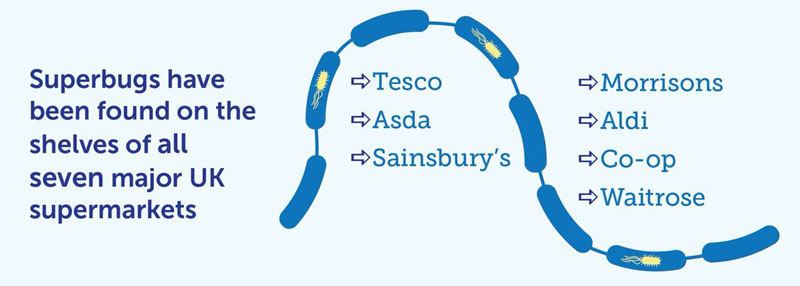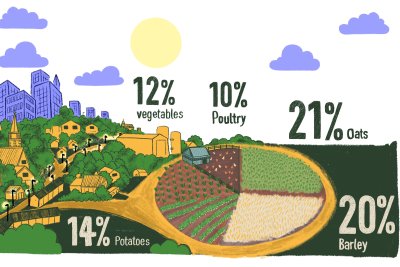

Shocking levels of antibiotic-resistant E.coli bacteria found in UK supermarket meat
A new study has revealed extremely high levels of E.coli resistant to essential antibiotics for treating serious human E. coli infections on British supermarket chicken and pork
The research found soaring levels of resistance in chicken meat, with 24% of samples testing positive for ESBL E.coli [1], a type of E.coli resistant to the ‘critically important’ modern cephalosporin antibiotics.
This is four times higher than was found during a similar study in 2015, in which just 6% of chicken tested positive for ESBL E.coli. Modern cephalosporins are widely used for treating life-threatening E.coli blood poisoning in humans.
The study is the first to examine UK-origin retail meat for resistance to a wide range of important antibiotics for treating E.coli infections. It found very high levels of resistance to two more highly important antibiotics.
A staggering 51% of the E.coli from pork and poultry samples were resistant to the antibiotic trimethoprim, which is used to treat over half of lower urinary-tract infections. In addition, 19% of the E.coli were resistant to gentamicin, a very important human antibiotic used to treat more serious upper urinary-tract infections [2].
The study, commissioned by the Alliance to Save our Antibiotics and carried out by scientists at Cambridge University, looked 189 UK-origin pig and poultry meat samples from the seven largest supermarkets in the UK (ASDA, Aldi, Coop, Morrisons, Sainsbury’s, Tesco and Waitrose). It tested for the presence of E. coli which are resistant to the key antibiotics for treating E. coli urinary-tract and blood-poisoning infections in people. The highly resistant ESBL E. coli was found on meat from all of the supermarkets.
The findings provide further evidence that the overuse of antibiotics used to mass medicate livestock on British farms is likely to be undermining the treatment of E. coli urinary-tract and blood-poisoning infections in humans. Some of the antibiotics tested are used in far greater quantities in livestock farming than in human medicine [3].
Emma Rose of the Alliance to Save our Antibiotics said: “These findings show the level of antibiotic resistance on retail meat to be worse than expected. Supermarkets must now publicly commit to polices which prohibit the routine mass-medication of groups of healthy animals, and take immediate steps to reduce farm use of the ‘Critically Important’ drugs.”
Dr Mark Holmes, from Cambridge University, who led the study said: “I’m concerned that insufficient resources are being put into the surveillance of antibiotic resistance in farm animals and retail meat. We don’t know if these levels are rising or falling in the absence of an effective monitoring system. These results highlight the need for improvements in antibiotic stewardship in veterinary medicine. While some progress has been made we must not be complacent as it may take many years before we see significant reductions in the numbers of antibiotic-resistant bacteria found in farms.”
E.coli is by far the most common cause of urinary-tract infections and of dangerous blood poisoning, and can also cause meningitis. These infections must be treated with antibiotics.
Figures compiled by the Alliance from official data show that the number of E.coli blood-poisoning infections has been increasing for the past 25 years and reached a record 45,666 in 2015 [4]. The increase is partly being driven by increasing resistance to key antibiotics in urinary-tract infections, resulting in more treatment failures and in some cases the development of serious blood-poisoning infections. No new antibiotics have been discovered for treating E.coli for 35 years.
The overuse of antibiotics in human medicine is part of the problem, but increasing scientific evidence from a wide range of studies shows that the routine dosing of animals on intensive farms raised in disease-inducing conditions, is also an important contributor [4].
The Alliance has raised the issue of farm-antibiotic use with all major retailers over the last few years, and has seen positive progress from Waitrose, who updated its policy in 2015 to state that antibiotics cannot be used for routine prophylaxis. In response to the testing, the Alliance is calling for further action from all seven supermarkets to tackle the use of antibiotics in their supply chains, by banning the routine preventative mass-medication of groups of animals, and dramatically curbing farm-use of the ‘critically important’ antibiotics [6].
The global network Avaaz has also launched a petition calling for urgent action [7].
Peter Melchett, policy director at the Soil Association said; “These results show how vital it is to minimise the use of antibiotics in farm animals and encourage farming systems that keep animals healthy without abusing medicines that are crucial to human health. Organic farmers have been doing this successfully for years without compromising animal welfare. Supermarkets must act to protect public health and support farmers to change their farming systems.”
Dr Ron Daniels BEM, Chief Executive of the UK Sepsis Trust, said: "This new research highlights a very worrying trend towards increasing resistance in E.coli on UK retail meat. E.coli in humans is the greatest cause of deaths from sepsis, and poor antimicrobial stewardship in intensive farming is undoubtedly contributing to this trend. It is of paramount importance that we act decisively to reduce this immediate threat to human life."
***ENDS***
Notes to editors
- ESBL E.coli stands for extended-spectrum beta-lactamase E.coli. Bacteria with ESBL resistance are resistant to nearly all antibiotics in the penicillin family of antibiotics (which includes the cephalosporins). The penicillin family of antibiotics, called the beta-lactams, are the most widely used and most important in human medicine.
- Information on the antibiotics used for treating urinary-tract infections in humans can be obtained from pp111-2 of ESPAUR 2014, https://www.gov.uk/government/uploads/system/uploads/attachment_data/file/362374/ESPAUR_Report_2014__3_.pdf
- Trimethoprim is commonly used to mass-medicate groups of animals via their feed or water, and significantly more trimethoprim is used in animals than is used in human medicine. Gentamicin is an aminoglycoside antibiotic, and about 20 times more aminoglycosides are used for mass medication in farming than in human medicine. Scientists have proven that the use of a veterinary aminoglycoside called apramycin is very likely to have contributed to gentamicin resistance in human E.coli infections. [See studies here and here]. Cephalosporins are licensed for use in pigs. In 2012, the UK poultry industry introduced a voluntary ban on the use of the cephalosporins. Penicillins are widely used in pigs and poultry, although total veterinary use represents less than one third of human use. Data on antibiotic use in farm animals and humans is available here: https://www.gov.uk/government/uploads/system/uploads/attachment_data/file/477788/Optimised_version_-_VARSS_Report_2014__Sales___Resistance_.pdf
- Data on the number of E. coli bacteraemia in 2015 England, Northern Ireland, Scotland and Wales, were obtained from publications by and Freedom of Information requests submitted to Public Health England, Northern Ireland’s Public Health Agency, Public Health Wales and Health Protection Scotland.
- http://www.ncbi.nlm.nih.gov/pubmed/19508163, https://www.ncbi.nlm.nih.gov/pmc/articles/PMC4424434/pdf/rstb20140085.pdf,
http://amr-review.org/sites/default/files/Antimicrobials%20in%20agriculture%20and%20the%20environment%20-%20Reducing%20unnecessary%20use%20and%20waste.pdf, http://www.thelancet.com/journals/lancet/article/PIIS0140-6736(15)00473-0/abstract - The Alliance is encouraging individuals to email supermarkets CEOs and call for an end to routine preventative mass-medication of groups of healthy animals, and for dramatic reductions to farm-use of the critically important antibiotics. www.saveourantibiotics.org/our-campaign/supermarket-superbugs
- Petition link: avaaz.org/en/uk_antibiotics_pr
The testing was carried out by Dr Mark Holmes - Reader in Microbial Genomics & Veterinary Science at the University of Cambridge.
The Alliance to Save Our Antibiotics is an alliance of health, medical, environmental and animal welfare groups working to stop the overuse of antibiotics in animal farming. It was founded by Compassion in World Farming, the Soil Association and Sustain in 2009, and is supported by the Jeremy Coller Foundation. Its vision is a world in which human and animal health and wellbeing are protected by food and farming systems that do not rely routinely on antibiotics and related drugs.
Media enquiries
- Emma Rose, Alliance to Save Our Antibiotics: 07917 799 203 - erose@saveourantibiotics.eu
- Natasha Collins-Daniel, Press Office Manager: 0117 914 2448 / 07827 925380 - ncollins-daniel@soilassociation.org
The Alliance to Save Our Antibiotics
Sustain - the Alliance for Better Food and Farming, advocates food and agriculture policies and practices that enhance the health and welfare of people and animals, improve the working and living environment, enrich society and culture and promote equity. We represent around 100 national public interest organisations working at international, national, regional and local level. www.sustainweb.org
The Soil Association was founded in 1946 by farmers, scientists, doctors and nutritionists to promote the connection between the health of the soil, food, animals, people and the environment. Today the Soil Association is the UK's leading membership charity campaigning for healthy, humane and sustainable food, farming and land use. Its Chief Executive is Helen Browning, and Chair of Trustees is Dennis Overton. Soil Association Certification is a wholly owned subsidiary which certifies over 70% of all organic products sold in the UK. Its Chief Executive is Martin Sawyer and its independent board is chaired by Nick Buckland. www.soilassociation.org
Compassion in World Farming is Europe’s leading farm animal welfare organisation working to end factory farming and to achieve humane and sustainable food. With headquarters in the UK, we have offices in France, Italy, the Netherlands and Poland, Brussels and the Czech Republic, as well as operating in the US, China and South Africa. www.ciwf.org.uk
Annex: Findings from antibiotic resistance testing of supermarket pork and chicken meat
Samples
In total 189 samples were tested. Of these 174 were from England, from London, the South of England, the South-West of England, the Midlands, and the North-East. A further 15 samples were tested from Scotland.
The meat tested included 97 pork samples (chops, loin, steak, belly, shoulder, mince, rashers and sausages) and 92 chicken samples (whole, legs, thighs, drumsticks, breasts, sausages).
The supermarkets were the seven largest supermarkets in the UK: ASDA, Aldi, Coop, Morrisons, Sainsbury’s, Tesco and Waitrose.
In total, 27 samples were bought from each supermarket chain.
Testing carried out
All meat samples were tested for resistance to:
- beta-lactam antibiotics (including ampicillin, amoxicillin and several cephalosporin antibiotics)
- ciprofloxacin (a fluoroquinolone antibiotic)
- aminglycoside antibiotics (including gentamcin)
- colistin (a polymixin antibiotic)
- carbapenem antibiotics (human-only antibiotics)
- trimethoprim
- tigecycline (a human tetracycline).
Presence of E. coli on meat samples
- E.coli was found on 186 of 189 samples (98%).
- E.coli was found on all 92 chicken samples (100%) and on 94 of 97 (97%) pork samples.
Resistance found
Resistance to modern cephalosporins (ESBL resistance)
Modern cephalosporins are classified by the World Health Organization as critically important in human medicine and are used for treating human E.coli blood-poisoning infections and upper urinary-tract (kidney) infections.
E.coli resistant to modern cephalosporins (3rd and 4th generation cephalosporins) are called ESBL E.coli (extended spectrum beta-lactamase E.coli).
Of the 92 chicken samples, 22 tested positive for ESBL E.coli (24%). No pork samples tested positive for ESBL E.coli.
ESBL-positive samples were found from all supermarkets:
- 5 from ASDA
- 4 each from the Coop and Sainsbury’s
- 3 from Aldi
- 2 each from Morrisons, Tesco and Waitrose.
ESBL positive samples included chicken thighs, legs, drumsticks, diced breasts, wings and sausages.
Gentamicin resistance
Gentamicin is very widely used for treating E.coli upper urinary-tract infections in humans.
In total 35 meat samples (19%) were positive for gentamicin-resistant E.coli.
This included 18 of 92 (20%) chicken-meat samples and 17 of 97 (18%) pork samples.
Gentamicin-resistant E. coli was found on meat from all supermarkets:
- 9 from Tesco
- 7 from Aldi
- 6 from Waitrose
- 4 each from ASDA and the Coop
- 3 from Morrisons
- 2 from Sainsbury’s.
Trimethoprim resistance
Trimethoprim is the most common treatment for lower E.coli urinary-tract infections in humans, used in over 50% of cases.
In total 97 (51%) meat samples were positive for trimethoprim-resistant E. coli.
This included 50 of 97 (52%) pork samples and 47 of 92 (51%) chicken-meat samples.
Trimethoprim-resistant E. coli was found on meat from all supermarkets:
- 16 from ASDA and Morrisons
- 14 each from the Coop and Tesco
- 13 each from Aldi and Sainsbury’s
- 11 from Waitrose.
Resistance to other beta-lactam antibiotics
Ampicillin used to be routinely used for treating human urinary-tract infections, but is no longer used because of high levels of resistance. Similarly, amoxycillin is being undermined as a suitable treatment for urinary infections due to resistance. As a result, amoxicillin is often given in combination with clavulanic acid which helps combat the bacterial resistance.
In total 54 (29%) meat samples were positive for ampicillin-resistant E.coli.
This included 33 of 92 (36%) chicken-meat samples and 22 of 97 (23%) of pork samples.
Just one chicken-meat sample was fully resistant to amoxicillin/clavulanic acid, and one further chicken-meat sample showed intermediate-level resistance.
No resistance found to fluoroquinolones, carbapenems or colistin
Fluoroquinolones are classified by the World Health Organization as critically important in human medicine, and are a treatment for E.coli infections, although efficacy is being undermined by rising levels of resistance.
Carbapenems are antibiotics used only in human medicine, which are used for treating highly resistant E. coli blood-poisoning infections.
Colistin is a last-resort antibiotic used for treating highly resistant E.coli blood-poisoning infections. It is used for mass medication in pigs and poultry. However, it is not nearly as widely used in UK farming as it is in many European countries.
No resistance was found to any of these antibiotics in E.coli from supermarket meat.
Save Our Antibiotics: The Alliance to Save Our Antibiotics is a coalition of health, medical, environmental and animal welfare groups campaigning to stop the overuse of antibiotics in animal farming.
Sustain
The Green House
244-254 Cambridge Heath Road
London E2 9DA
020 3559 6777
sustain@sustainweb.org
Sustain advocates food and agriculture policies and practices that enhance the health and welfare of people and animals, improve the working and living environment, promote equity and enrich society and culture.
© Sustain 2025
Registered charity (no. 1018643)
Data privacy & cookies
Icons by Icons8







